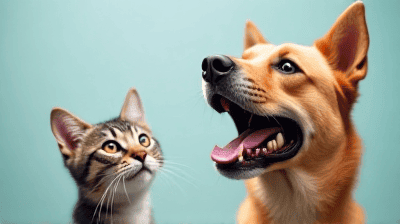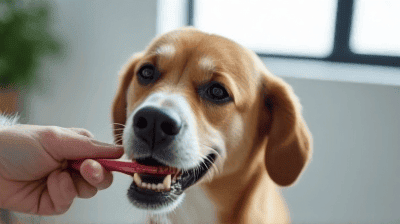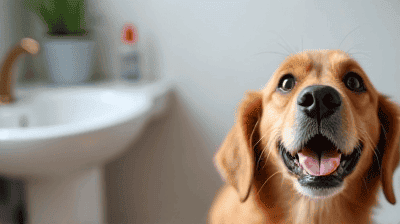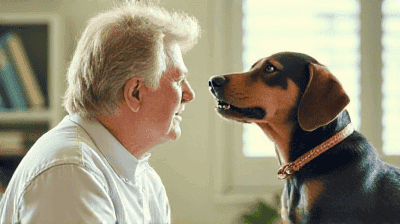The Ultimate Guide to Dental Care for Dogs and Cats

Maintaining the health of your pets goes beyond just providing regular food and exercise; dental care is a crucial aspect that often gets overlooked. Just like humans, dogs and cats can suffer from dental diseases that may lead to serious health issues if left untreated.
The Importance of Dental Care for Pets
Why Dental Health Matters
Dental health is vital for your pets for several reasons:
Preventing Oral Diseases: Regular dental care helps prevent the buildup of plaque and tartar, which can lead to periodontal disease, gingivitis, and tooth loss.
Overall Health: Poor dental health can result in bacteria entering the bloodstream, potentially affecting vital organs such as the heart, liver, and kidneys.
Quality of Life: Dental pain can significantly affect your pet's quality of life. Pets with dental issues may be reluctant to eat, play, or engage in regular activities.
Longevity: Good dental care can contribute to a longer, healthier life for your pets.
Common Dental Problems in Pets
Understanding the common dental issues that dogs and cats face is essential for effective prevention and treatment:
Plaque and Tartar Buildup: Plaque is a sticky film of bacteria that forms on teeth. If not removed, it hardens into tartar, leading to more severe dental problems.
Gingivitis: Inflammation of the gums, often caused by plaque buildup. It can be reversed with proper dental care.
Periodontal Disease: A more serious condition that can develop if gingivitis is left untreated. It involves infection and inflammation of the tissues surrounding the teeth.
Tooth Decay: Cavities can develop in pets, especially in those that consume sugary foods or have poor dental hygiene.
Tooth Loss: Advanced dental disease can lead to loss of teeth, which can affect your pet's ability to eat and drink.
Oral Tumors: While less common, some pets can develop tumors in their mouths, requiring veterinary intervention.
Signs of Dental Issues in Pets

Being able to recognize the signs of dental problems can help you take timely action. Watch for the following symptoms:
Bad Breath: While some odor is normal, persistent foul breath can indicate dental disease.
Changes in Eating Habits: If your pet is chewing differently, dropping food, or refusing to eat, there may be an underlying dental issue.
Drooling: Excessive drooling can be a sign of pain or discomfort in the mouth.
Gum Swelling or Redness: Healthy gums should be pink and firm. Red or swollen gums are a sign of gingivitis.
Difficulty Chewing: If your pet is reluctant to chew or if you notice them favoring one side of their mouth, it could indicate dental pain.
Visible Tartar: Brownish build-up on the teeth indicates tartar accumulation, which requires dental care.
Behavioral Changes: Increased irritability or changes in activity levels may also suggest oral pain.
Establishing a Dental Care Routine
Creating a dental care routine for your pets is essential for maintaining their oral health. Here are some effective strategies:
1. Regular Veterinary Check-ups
Schedule Dental Exams
- Regular veterinary check-ups are crucial for identifying and treating dental issues early. Most veterinarians recommend dental examinations at least once a year.
Professional Cleanings
- Your veterinarian may recommend professional dental cleanings to remove plaque and tartar buildup that cannot be addressed at home.
2. Daily Brushing
Why Brushing Matters
- The gold standard for dental care is daily brushing, which helps remove plaque before it can harden into tartar.
How to Brush Your Pet's Teeth
Choosing a Toothbrush: Invest in a toothbrush specifically designed for pets. Finger brushes can be suitable for smaller animals.
Selecting the Right Toothpaste: Use toothpaste formulated for pets. Human toothpaste contains ingredients that can be harmful to animals.
Establishing a Routine: Introduce brushing gradually to help your pet get comfortable. Start by letting your pet taste the toothpaste, then gradually incorporate brushing.
Technique: Aim to brush all surfaces of the teeth, focusing on the areas where plaque tends to accumulate, such as the back molars.
3. Dental Chews and Treats
Benefits of Dental Chews
- Dental chews are designed to help reduce plaque and tartar buildup while providing an enjoyable experience for your pets.
Choosing the Right Chews
- Look for products with the Veterinary Oral Health Council (VOHC) seal of approval, indicating they meet specific dental health standards.
4. Quality Diet
Nutritional Impact on Dental Health
- Feeding your pets a balanced diet can have a significant impact on their dental health. High-quality kibble can provide some natural abrasion that helps keep teeth cleaner.
Avoiding Sugary Foods
- Minimize sugary treats, as sugar can lead to plaque formation and tooth decay. Instead, focus on healthy snacks designed for dental health.
5. Water Additives and Oral Rinses
Promoting Oral Health Through Drinking Water
- Dental water additives can be mixed with your pet's drinking water to help reduce plaque and maintain fresh breath.
Consult Your Veterinarian
- Always consult with your veterinarian before incorporating new products into your pet's dental care routine to ensure they are safe and effective.
Recognizing Serious Dental Issues

In some cases, dental problems can escalate quickly. Recognize when to seek professional help:
Severe Pain: If your pet shows signs of significant pain, such as whining or avoiding touch, seek veterinary care.
Infection Signs: Unusual swelling, discharge, or pus in the mouth could indicate an infection requiring immediate attention.
Persistent Bad Breath: Bad breath that does not improve with regular care may signify an underlying problem.
Changes in Behavior: A sudden change in behavior, including withdrawal or aggression, can be linked to pain from dental issues.
Treatment Options for Dental Problems
When dental issues are identified, your veterinarian will recommend appropriate treatment options based on the condition's severity. Common treatments include:
1. Professional Cleanings
Importance of Routine Cleanings
- Professional cleanings involve a thorough examination and scaling to remove plaque and tartar buildup both above and below the gum line.
2. Dental Extractions
When Extractions Are Necessary
- Whenever dental disease is advanced and teeth are severely damaged, extraction may be necessary to alleviate pain and prevent the spread of infection.
3. Antibiotic Therapy
Managing Infections
- In cases of significant infection, antibiotics may be prescribed to manage the condition and promote healing after dental procedures.
4. Oral Surgery
Advanced Procedures
- For more serious conditions, such as tumors or advanced periodontal disease, oral surgery may be necessary.
Pet Dental Health Myths

Understanding common myths related to pet dental health can help you make informed choices for your furry friends:
Myth: Dogs and cats don’t need dental care because they eat dry food.
- Reality: Even pets on dry food can develop dental problems. Regular dental care is essential regardless of diet.
Myth: Bad breath is normal in pets.
- Reality: While some odor is normal, persistent bad breath often indicates an underlying dental issue.
Myth: Brushing is unnecessary if you use dental chews.
- Reality: Dental chews can be beneficial, but they should not replace regular brushing.
Myth: Only senior pets need dental care.
- Reality: Dental care is important for pets of all ages, including young pets.
Tips for Introducing Dental Care
If you haven’t previously prioritized dental care for your pets, it’s not too late to start. Follow these tips for a smooth introduction:
Take it Slow: Gradually introduce dental care products and practices to reduce stress for your pet.
Use Positive Reinforcement: Reward your pet with treats or praise during and after dental care to create a positive association.
Be Consistent: Establish a regular dental care schedule. Consistency is key to maintaining your pet’s oral health.
Stay Calm: Your demeanor can influence your pet. Maintain a calm, positive atmosphere during dental care sessions.
Conclusion
Dental care is an essential aspect of pet ownership that directly impacts the health and well-being of our furry friends. By understanding the importance of dental health, recognizing potential problems, and establishing a consistent dental care routine, you can help prevent oral diseases and promote a longer, healthier life for your pets.
Investing time and effort in your pet's dental care not only enhances their quality of life but also fosters a stronger bond between you and your beloved animal companions. It’s never too late to start prioritizing dental health, so take the first steps today toward ensuring that your pets have bright, happy smiles.







